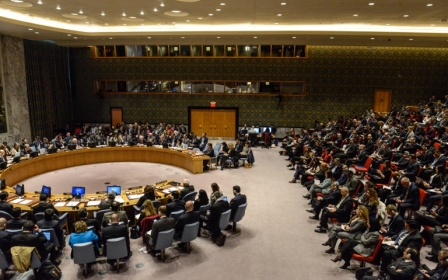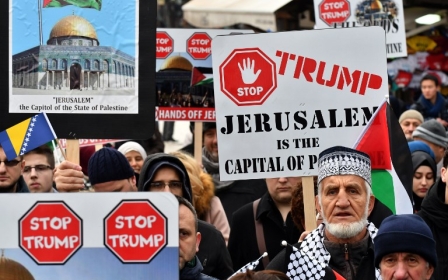US vetoes UN call for withdrawal of Trump Jerusalem decision
The United States on Monday vetoed a draft UN resolution rejecting President Donald Trump's decision to recognise Jerusalem as Israel's capital, after all 14 other Security Council members backed the measure.
Key US allies Britain, France, Italy, Japan and Ukraine were among the 14 countries in the 15-member council that voted in favour of the proposed measure put forward by Egypt, which did not specifically mention the United States or Trump but which expressed "deep regret at recent decisions concerning the status of Jerusalem".
What we witnessed here today in the Security Council is an insult. It won't be forgotten
- US Ambassador Nikki Haley
The draft also affirmed "that any decisions and actions which purport to have altered the character, status or demographic composition of the Holy City of Jerusalem have no legal effect, are null and void and must be rescinded in compliance with relevant resolutions of the Security Council".
Trump abruptly reversed decades of US policy this month when he recognised Jerusalem as Israel's capital, generating outrage from Palestinians and the Arab world and concern among Washington's western allies.
Trump also plans to move the US embassy to Jerusalem from Tel Aviv.
"In the wake of the decision of the United States ... the situation has become more tense with an increase in incidents, notably rockets fired from Gaza and clashes between Palestinians and Israeli security forces," UN Middle East peace envoy Nickolay Mladenov told the Security Council ahead of the vote.
He briefed the council on the implementation of a resolution adopted in December 2016 that demanded an end to Israeli settlement building. Mladenov said that "no such steps" had been taken by Israel.
That resolution was approved with 14 votes in favour and an abstention by former US President Barack Obama's administration, which defied pressure from Israel and Trump, who was then president-elect, for Washington to wield its veto.
"We call on all sides to come and negotiate ... Not to come to the Security Council or to the General Assembly, it's a waste of time. The only way to move forward is by direct negotiations," Danny Danon, Israel's ambassador to the United Nations, told reporters before the vote on Monday.
The draft resolution had also called upon all countries to refrain from establishing diplomatic missions in Jerusalem.
"It is in line with previous Security Council resolutions," British UN Ambassador Matthew Rycroft said of the text voted upon on Monday.
Israel considers Jerusalem its capital and wants all embassies based there. Palestinians want the capital of an independent state to be in the city's eastern sector, which Israel occupied in 1967 and annexed in a move never recognised internationally.
US Ambassador Nikki Haley told the council before the vote: "The United States has an undiminished commitment to helping bring about final status negotiations that will lead to lasting peace. Our hand remains extended to both parties."
Following the vote, Haley slammed the draft resolution as "an insult".
"What we witnessed here today in the Security Council is an insult. It won't be forgotten," said Haley, describing the measure as "one more example of the United Nations doing more harm than good in addressing the Israeli-Palestinian conflict".
Israeli Prime Minister Benjamin Netanyahu had high praise for Haley and the US veto of the resolution shortly after the vote.
The Palestinian government slammed the US veto as "unacceptable".
A spokesman for Palestinian President Mahmoud Abbas said the veto was "unacceptable and threatens the stability of the international community because it disrespects it".
Nabil Abu Rudeina told AFP in Arabic that the support for the resolution, which included US allies France, Italy and Japan, "showed the (American) isolation. The international community must work now to protect the Palestinian people".
Middle East Eye propose une couverture et une analyse indépendantes et incomparables du Moyen-Orient, de l’Afrique du Nord et d’autres régions du monde. Pour en savoir plus sur la reprise de ce contenu et les frais qui s’appliquent, veuillez remplir ce formulaire [en anglais]. Pour en savoir plus sur MEE, cliquez ici [en anglais].




